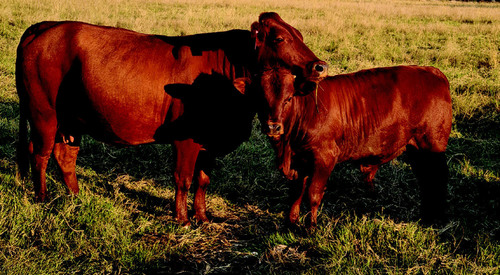Dry season feeding and supplementation for grazing animals requires good planning. The plan should take into account of the long-term effect of the dry season on the land, pasture, finances, people, and cattle.
Assessing pasture quantity and quality and adjusting stock numbers accordingly can reduce the need for high-cost feeding. Animal welfare is a very important issue, particularly in such times, and must be considered when making any management decision.
Efficient feeding depends on segregating cattle according to their feed requirements, identifying the nutrient most limiting production, and selecting the right feed for the situation. As such, one needs to determine what nutrients are limiting or are most likely to limit performance; and then choose a supplement that rectifies the deficiency and achieves the desired performance economically.
Dry feed (grass) is often deficient in protein and sulphur. In cases where the vegetation is green but very short, it is the low energy in the vegetation that limits production.
Late in the season, there is plenty of poor-quality dry feed (grass), which animals cannot use efficiently. Supplementary feeding at this stage aims to make better use of this feed by supplying those nutrients that the pasture lacks, so that animals can be maintained affordably.
Principles of supplementation
- Minimal disruption of the animal’s digestive system.
- Choose the most appropriate feeding technique.
- Cost out the programme, considering alternative measures.
- Start feeding those animals with the greatest needs (for example pregnant cows with a low-fat score, or weaners below critical weights), and monitor feed consumption, weight, and condition, so that you can confirm that your strategy is working.
Depending on the nature of the supplement (energy or protein supplement) used and its interaction with the pasture during digestion, the three possible outcomes are:
- Supplementation
The supplement is eaten and pasture intake is unchanged — this is a rare event. - Substitution
The supplement eaten causes reduced pasture intake — this happens with high-energy feed supplementation. - Complementation
The supplement is eaten and pasture intake increases. This occurs when animals are grazing on dry pasture or crop stubble and the supplement improves the animals’ ability to utilise the feed.
For grazing cattle, use Winter 100 and for sheep and goats, use Ewe Mix concentrates for minimizing weight loss during the dry season by supplying proteins, energy, vitamins, and minerals.
Farmers can further supplement the vitamins and minerals provided in the mentioned concentrates, with Rainfos P15 Concentrate in both the dry and wet seasons. These products offer both substitutional and complementary effects on the pasture.
For more information on Novatek’s products, contact the technical team for further help regarding options available for dry season feeding and other general options for livestock farming. Send an e-mail to salesmanager@novatek. co.zm or call Robert Kanyembo on (+26)-978-779-017.












